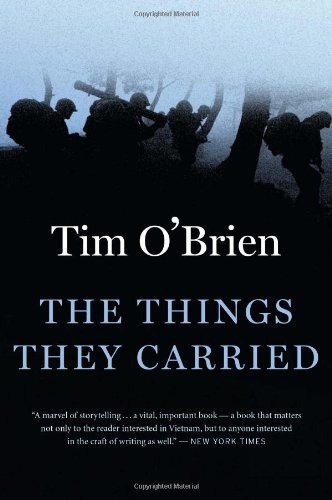All Nonfiction
- Bullying
- Books
- Academic
- Author Interviews
- Celebrity interviews
- College Articles
- College Essays
- Educator of the Year
- Heroes
- Interviews
- Memoir
- Personal Experience
- Sports
- Travel & Culture
All Opinions
- Bullying
- Current Events / Politics
- Discrimination
- Drugs / Alcohol / Smoking
- Entertainment / Celebrities
- Environment
- Love / Relationships
- Movies / Music / TV
- Pop Culture / Trends
- School / College
- Social Issues / Civics
- Spirituality / Religion
- Sports / Hobbies
All Hot Topics
- Bullying
- Community Service
- Environment
- Health
- Letters to the Editor
- Pride & Prejudice
- What Matters
- Back
Summer Guide
- Program Links
- Program Reviews
- Back
College Guide
- College Links
- College Reviews
- College Essays
- College Articles
- Back
The Things They Carried by Tim O'Brien
In The Things They Carried, Vietnam veteran Tim O’Brien recalled his own wartime encounters, called them fiction, and created one of the most emotionally potent books ever written. What actually occurred is besides the purpose of his words. His choice of vocabulary is simple yet, very blunt and real. He conveyed genuine emotion very direct but at the same time subtle. It’s hard to not get a clear idea of the life of a soldier in Vietnam. Although O’Brien mentions authentic war terminology, the overall concept of the book is dedicated to the human milieu. O’Brien does not praise a heroic character, as a typical war story would consist of; instead he makes these soldiers as legitimate possible to explore their emotions. The Things They Carried captures the human sensation in a time of fear and chaos. Some of the scenes may come off a bit strong due to O’Brien cutting straight to the core of our fragile lives. For example, one of his stories consists of a man dying from being sucked under mud during a mortar attack. He does not write this in the perspective of the dying man but rather from the soldier next him, then the man who takes him out of the mud the following day. That’s what makes this book so utterly put together. It’s almost as if O’Brien exports you to the day where these events “happened”.
Categorizing this book as fiction only allows the reader to meld with it, giving an ownership that nonfiction would not provide. Perhaps if O’Brien had created it nonfiction this would have been seen to the reader as emotions that only O’Brien had felt in his “past events”. You don’t have to know the war terminology, which is a great misconception to those who have not read this book, to understand the emotion of the characters. Overall, I would recommend this book to anyone seeking for a good book about the real emotions of humanity during a time of disorder. It’s more than just a war story, it’s a human story.
,
Similar Articles
JOIN THE DISCUSSION
This article has 0 comments.

